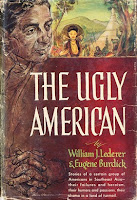The Ugly American by William J. Lederer
My rating: 5 of 5 stars
I first encountered this book as part of an undergraduate political science class on American politics. Among other long and dry reading assignments, I found myself thoroughly engaged in the book and looking forward to spending time reading Lederer and Burdick's work. In fact, I'd have to say that it has been my favorite book since that political science class almost 25 years ago.
I have read it at least 20 times in those 25 years (often as a source for a paper I was writing, but also for pleasure). While this is not a typical "beach read" I have re-read it while traveling and at the beach on several occasions. This past week I was on a business trip and sleeping in a hotel room. This combination of factors is usually good for a bout of insomnia on my part, and this trip was no different. Lederer and Burdick came to my rescue yet again and provided a thoroughly enjoyable way to pass through several hours of insomnia.
The story(ies) centers on a fictional country in Southeast Asia named Sarkhan. The book's chapters compare and contrast the competence and incompetence on the part of the diplomats, politicos, military officers and ex-pats in Sarkham. Heroes include Ambassador Gilbert McWhite, John Colvin, and Homer Atkins (THE ugly American) -— all men who took the time to learn the culture in which they were being planted.
It is easy (now, with 20/20 hindsight) to see this book as a parable stemming from the Vietnam War. However, the book was written well before American stepped up its involvement in Vietnam (in 1958) and was purportedly read by President Eisenhower and responsible for many of the reforms that he introduced into America's foreign aid programs. The general thesis of the authors was that US diplomats (and other foreign station workers/advisors) who failed to study and adapt to the cultures they were entering, were doomed to failure (or worse). Worse still, the American bureaucracy wasn't interested in the opinions of the Foreign Service staff that did study and understand the cultures into which they were placed.
Given that this book was written at the tail end of the McCarthy era, the insights of Lederer and Burdick are quite exceptional (if fact, some government agencies sought to ban the book in Asia and in many ways that (failed) effort can be seen as one of the last "scenes" of the McCarthy era). Burdick and Lederer are at once, tongue in cheek, cynical and satirical in their views of American foreign policy
Every time that I read this book, I can't put it down. Despite its age, it is still a fine read and certainly has additional significance in today's world as the U.S. fights wars in Iraq and Afghanistan. Although some parts of the book are antiquated (in particular the parochial way the authors treat the few female characters -- especially the Marie MacIntosh character), that small niggle can be forgiven to a book that retains its readability and relevance 50 years after it was first published.
View all my reviews

No comments:
Post a Comment